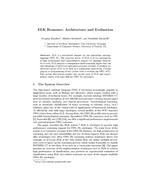Inproceedings4013: Unterschied zwischen den Versionen
Aus International Center for Computational Logic
Markus Krötzsch (Diskussion | Beiträge) K (Textersetzung - „Frantisek Simancik“ durch „František Simančík“) |
Markus Krötzsch (Diskussion | Beiträge) Keine Bearbeitungszusammenfassung |
||
| Zeile 1: | Zeile 1: | ||
{{Publikation Erster Autor | {{Publikation Erster Autor | ||
|ErsterAutorVorname=Yevgeny | |||
|ErsterAutorNachname=Kazakov | |ErsterAutorNachname=Kazakov | ||
|FurtherAuthors=Markus Krötzsch; František Simančík | |||
|FurtherAuthors=Markus Krötzsch | |||
; František Simančík | |||
}} | }} | ||
{{Inproceedings | {{Inproceedings | ||
| Zeile 15: | Zeile 14: | ||
}} | }} | ||
{{Publikation Details | {{Publikation Details | ||
|Abstract=ELK is a specialized reasoner for the lightweight ontology language OWL EL. The practical utility of ELK is in its combination of high performance and comprehensive support for language features. At its core, ELK employs a consequence-based reasoning engine that can take advantage of multi-core and multi-processor systems. A modular architecture allows ELK to be used as a stand-alone application, Protégé plug-in, or programming library (either with or without the OWL API). This system description presents the current state of ELK and experimental results with some difficult OWL EL ontologies. | |Abstract=ELK is a specialized reasoner for the lightweight ontology language OWL EL. The practical utility of ELK is in its combination of high performance and comprehensive support for language features. At its core, ELK employs a consequence-based reasoning engine that can take advantage of multi-core and multi-processor systems. A modular architecture allows ELK to be used as a stand-alone application, Protégé plug-in, or programming library (either with or without the OWL API). This system description presents the current state of ELK and experimental results with some difficult OWL EL ontologies. | ||
|Download=Ore2012 paper10.pdf | |Download=Ore2012 paper10.pdf | ||
|Link=http://ceur-ws.org/Vol-858/ | |Link=http://ceur-ws.org/Vol-858/ | ||
|Forschungsgruppe=Knowledge Systems | |Forschungsgruppe=Knowledge Systems | ||
|DOI=http://ceur-ws.org/Vol-858/ore2012_paper10.pdf | |DOI=http://ceur-ws.org/Vol-858/ore2012_paper10.pdf | ||
}} | |||
{{Forschungsgebiet Auswahl | |||
|Forschungsgebiet=Beschreibungslogiken | |||
}} | |||
{{Forschungsgebiet Auswahl | |||
|Forschungsgebiet=Wissensrepräsentation und logisches Schließen | |||
}} | }} | ||
Version vom 28. Oktober 2014, 18:54 Uhr
ELK Reasoner: Architecture and Evaluation
Yevgeny KazakovYevgeny Kazakov, Markus KrötzschMarkus Krötzsch, František SimančíkFrantišek Simančík
Yevgeny Kazakov, Markus Krötzsch, František Simančík
ELK Reasoner: Architecture and Evaluation
Proc. of the OWL Reasoner Evaluation Workshop 2012, July 2012. CEUR Workshop Proceedings
ELK Reasoner: Architecture and Evaluation
Proc. of the OWL Reasoner Evaluation Workshop 2012, July 2012. CEUR Workshop Proceedings
- KurzfassungAbstract
ELK is a specialized reasoner for the lightweight ontology language OWL EL. The practical utility of ELK is in its combination of high performance and comprehensive support for language features. At its core, ELK employs a consequence-based reasoning engine that can take advantage of multi-core and multi-processor systems. A modular architecture allows ELK to be used as a stand-alone application, Protégé plug-in, or programming library (either with or without the OWL API). This system description presents the current state of ELK and experimental results with some difficult OWL EL ontologies. - Weitere Informationen unter:Further Information: Link
- Forschungsgruppe:Research Group: Knowledge SystemsKnowledge-Based Systems
@inproceedings{KKS2012,
author = {Yevgeny Kazakov and Markus Kr{\"{o}}tzsch and Franti{\v{s}}ek
Siman{\v{c}}{\'{\i}}k},
title = {ELK Reasoner: Architecture and Evaluation},
booktitle = {Proc. of the {OWL} Reasoner Evaluation Workshop 2012},
publisher = {CEUR Workshop Proceedings},
year = {2012},
month = {July}
}
